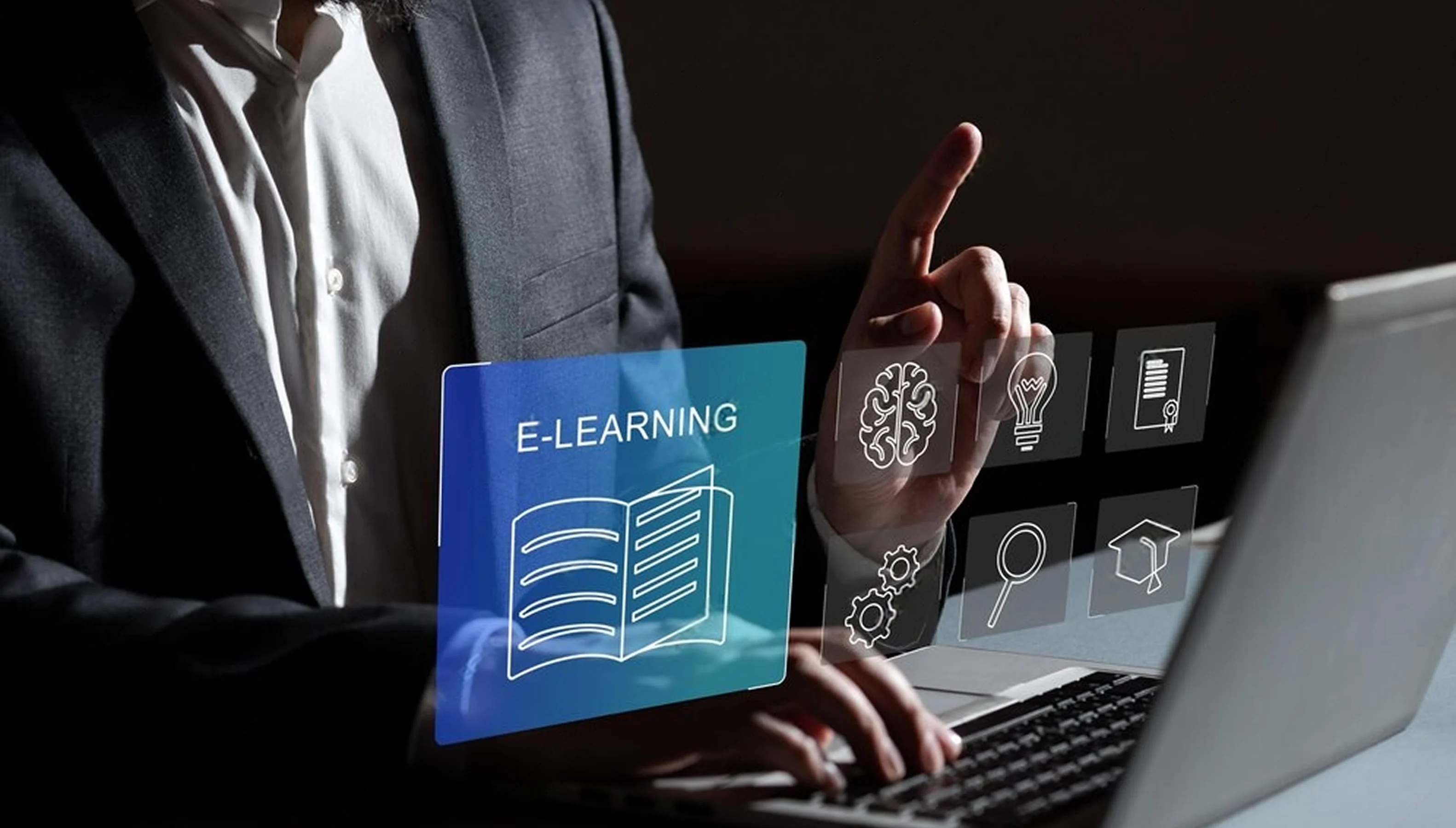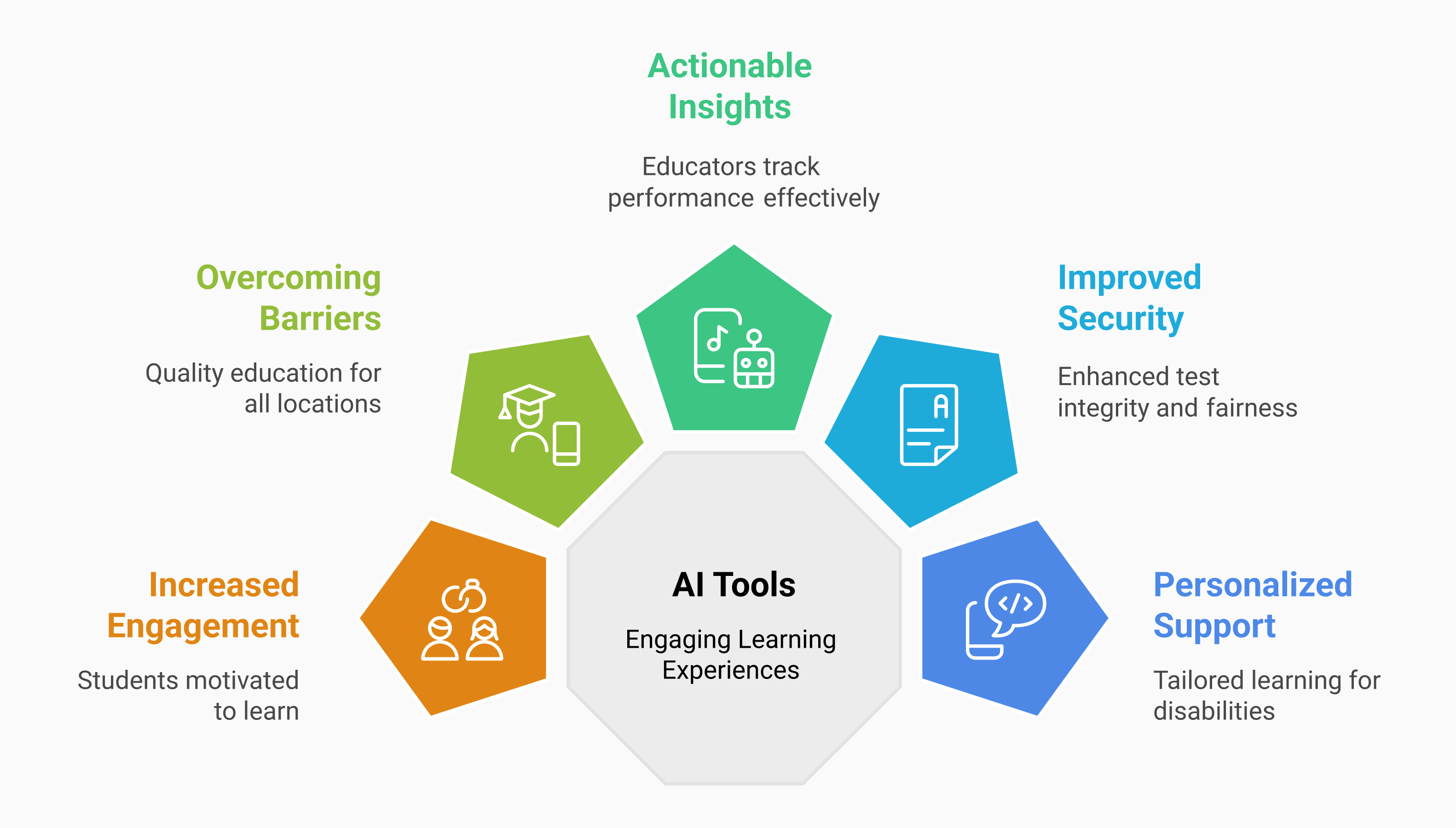AI/ML
AI in Education: How AI Can Transform Learning for the Future?
Written ByYash Vibhandik
CEO, Bitontree
Published:26 February 2025
30 minutes read

Imagine a classroom where every student gets 1:1 tutoring, and all the complications, like a pupil struggling to keep up and anxiety about speaking up, are eliminated, and engagement comes naturally.
The traditional classrooms, which were once a place of standardized instructions and rote memorization, are undergoing a complete transformation. With Artificial Intelligence transforming the education landscape, learning no longer follows the classic one-size-fits-all approach.
All students learn in different ways, and AI adoption in education focuses on personalizing learning experiences based on what works best for an individual student. The global AI in education market is projected to grow at a CAGR of 31.2% during the forecast period of 2024 to 2030.
The increase is due to the need for personalized learning experiences. Schools and universities are investing in AI-powered platforms, such as Intelligent Tutoring Systems (ITS), chatbots, and learning analytics to boost student engagement.
However, the impact of AI in education is not just limited to personalization. AI helps bridge the gaps between students and conventional teaching approaches. From providing gamified and immersive learning lessons to providing comprehensive feedback after analyzing student reports, the potential of AI in improving learning is vast.
Use Cases of AI in Education
AI is like a personal assistant for both students and educators. It assists them in overcoming the obstacles they face. While AI provides constructive feedback and explains the topic more elaboratively to students, it helps educators to automate routine tasks, like grading and marking attendance.
Whatever the case, Artificial Intelligence is revolutionizing the education sector. Let’s explore the use cases on how AI is transforming the modern learning module.
1.) Adaptive Learning

AI-driven platforms help educators assess students' skill levels in real time by analyzing their learning graphs. It analyzes the needs of every differently-abled and individual student and subsequently adjusts the content as well as the learning journey. It develops a schedule so that students can learn by practising at their speed, in the needed way, like visually, auditory, or kinesthetic. This prevents the cookie-cutter approach and helps focus more on weak students.
According to research by Knewton, students who leverage adaptive learning programs can boost their test results by 62% comparatively. For instance, the Khan Academy program adjusts the learning pace according to students’ knowledge. If the student answers questions correctly, the program will increase the level of difficulty. In case of incorrect answers, the program will prompt easier questions until the student has gained mastery.
Besides, Khan Academy has an AI chatbot Tutor that uses the Socratic Method for prompt critical thinking and independent problem-solving. Like, when a student asks a Math-related question, instead of directly solving the problem, the chatbot will respond with questions like “can you explain your reasoning?” or “what do you think the next step should be?”.
2.) AI-driven LMS

COVID acted as a catalyst in driving the adoption of Learning Management Systems (LMS). Now, with further refinement, AI is integrated into LMS through a multitude of features that track student progress in real-time, predict dropout risks, and monitor behaviour. With a detailed report for every student, educators can intervene at the right time and help the student with respective resources.
For instance, Blackboard by Anthology is a learning management system which features an AI Design Assistant that can build new courses, saving educators time. It can curate AI-generated content of upto 10 difficulty levels, from early primary school to advanced PhD level.
3.) Intelligent Tutoring Systems

Artificial intelligence-based tutoring systems give students tailored guidance and feedback. The AI-powered systems are designed to stimulate teacher’s expertise and offer explanations, answer questions, and detect mistakes.
With round-the-clock assistance, students do not have to wait till the next to get assistance. Intelligent tutoring systems bridge the gap for remote learners or underprivileged students to get access to tutoring lessons.
4.) AI-Automated Grading Systems

AI-powered systems are a boon for educators as these systems help in automating the most time-consuming tasks - evaluation and grading. With automated workflows, educators can streamline the process of evaluating, assessing, and grading the results from quizzes, assignments, and essays. It completes the assessment checking process quickly while ensuring complete fairness and consistency. With automated assessment, students can get feedback and their marks instantly, and it helps refine their strategy.
5.) Automated Administrative Tasks

AI can be integrated into existing institution management systems that can help in automating different tasks, like optimal class schedules, automated fee reminders, fee invoice generation, organising and storing digital records, and arrangement of substitute periods. It can automate other administrative tasks, like enrollment, attendance tracking, and scheduling, with optimized resource allocation. With assistance with completing administrative tasks, educators and administrators can focus on student-centric activities.
Benefits of AI in Education

Artificial Intelligence is not only a promise for our future anymore - it's already making education better today. From examining learning patterns to enriching the educational content, here’s how AI benefits educators and students:
1.) Increasing Learner's Engagement
AI learning tools can enhance the engagement of students as learning gets gamified and interactive. Applications with integrated Interactive AI, such as Quizizz, support gamified quizzes, which makes learning fun. With a user-friendly interface and a multitude of customization options available, it makes it easier for educators as well to create gamified quizzes for the students. These AI-powered tools create engaging learning experiences that capture the interests of students and motivate them to retain information.
2.) Overcoming Geographical Barriers
When a student is located far away, their exposure to experienced instructors and updated study materials may be compromised. The integration of education and artificial intelligence provides quality education to students' devices directly, regardless of geographical boundaries. Seamless accessibility as such allows students, wherever they are located to provide them with the chance to learn and develop at their own pace.
3.) Gaining Actionable Insights
Artificial intelligence can analyze vast amounts of education to provide educators with actionable insights. It will help them to track student performance across various metrics. Teachers and professors can identify learning gaps and adjust their instructional strategies accordingly. As a result, a productive and motivated classroom environment can be maintained.
4.) Ensuring Better Security and Integrity
AI strengthens the security and integrity of students’ tests with advanced proctoring and plagiarism checks. For example, software such as Turnitin employs AI-based proctoring systems to scan for originality in students' work and ensure exam conditions are secure against cheating. The standardized grading and assessment method will maximize the resources and minimize the workload on teachers.
5.) Assisting Students with Learning Disabilities
AI also promises a lot for students with learning disabilities by providing them with personalized learning experiences tailored to their specific difficulties. Applications such as Ghotit employ AI to help students with dyslexia and other writing difficulties. This helps them improve their writing via personalized recommendations and corrections. Furthermore, AI reading assistants can make learning material more readily available to students with disabilities.
How Can AI Address Key Challenges in Education Operations?
More and more educational institutions are increasingly incorporating AI into their curricula, taking advantage to create dynamic learning environments for each student. Let us explore how AI addresses the challenges in conventional educational operations.
1.) Admissions and Enrollment
Challenge: Excessive number of applications and lengthy manual processing.
Solution: The process of admission is usually done manually by sorting applications, verifying documents, and so on with potential students, which can cause delays and possible mistakes. Implementing AI tools for education will help in the time-consuming process of admission. Authorities can screen applications easily, check documents, and automate student communication through email or chatbots. AI can mark any missing or incomplete data, criticizing high-potential candidates for review.
2.) Attendance Management
Challenge: Manually tracking attendance is labor-intensive, error-prone, and creates inaccurate records.
Solution: As schools and institutions choose to adopt the future of AI in education, they can leverage AI-driven facial or fingerprint recognition systems coupled with student databases. It will enable them to automate attendance tracking in class and during exams. The system can access real-time information, authenticate every student's presence instantly, and update records hassle-free.
3.) Personalized Learning
Challenge: Addressing the unique learning needs of a heterogeneous student population.
Solution: The greatest achievement introduced by artificial intelligence in education is customized learning. AI-based platforms are able to strike a balance between your learning habits, strengths, and weaknesses and accordingly customize the content. The customization helps students learn at their own pace and in their own way, which improves results substantially. For example, platforms such as Dreambox Learning utilize AI to deliver math lessons customized for every student's learning requirements, showing considerable improvements in math skills.
4.) Student Retention and Success
Challenge: Early identification of students at risk and timely interventions.
Solution: Students are reluctant to ask questions during class for fear of being judged by their peers, particularly those who feel they are lagging. AI-driven learning interfaces can give positive feedback in a friendly manner, which will help them open up more, be more risk-taking, and be more vulnerable.
For instance, Georgia State University launched Pounce, an AI-powered assistant, to deliver personalized guidance to admitted students to help them successfully enroll in college and identify friction points in their journey. It helped increase the student retention rate by 5% and re-enrollment rate by 3%.
The Bottom Line
As AI in education continues to weave its way, its impact on schools and colleges will be profound and inevitable. However, the integration also brings in challenges that demand careful consideration of ethical, privacy, and equity issues.
To achieve the AI vision, the plan needs strategic execution, and Bitontree ensures successful AI development and implementation. We offer customized, practical approaches to harness the AI’s potential while making sure it enhances rather than disrupts the learning process. We build and deploy platforms using next-generation technologies that help schools and institutions produce improved results for students and teachers alike.
How do you think AI will help you shape the learning experience? Share your thoughts with our experts, and we will help you in making it a reality.
Transform Learning with AI – Discover the Impact!
Related Blogs
Frequently Asked Questions
AI analyzes student data, learning patterns, and progress to tailor lesson plans, recommend resources, and adjust difficulty levels, ensuring each student learns at their own pace.
AI-powered platforms offer tailored training modules, real-time feedback, and skill assessments, making employee learning more effective and reducing training costs for enterprises.
AI-powered tools like speech-to-text, text-to-speech, and real-time captions make learning more accessible for students with visual, hearing, or cognitive impairments. AI also enables adaptive learning techniques tailored to individual needs.
Yes, AI reduces long-term operational costs by automating repetitive tasks, improving learning outcomes, and enhancing student retention, leading to higher ROI.











